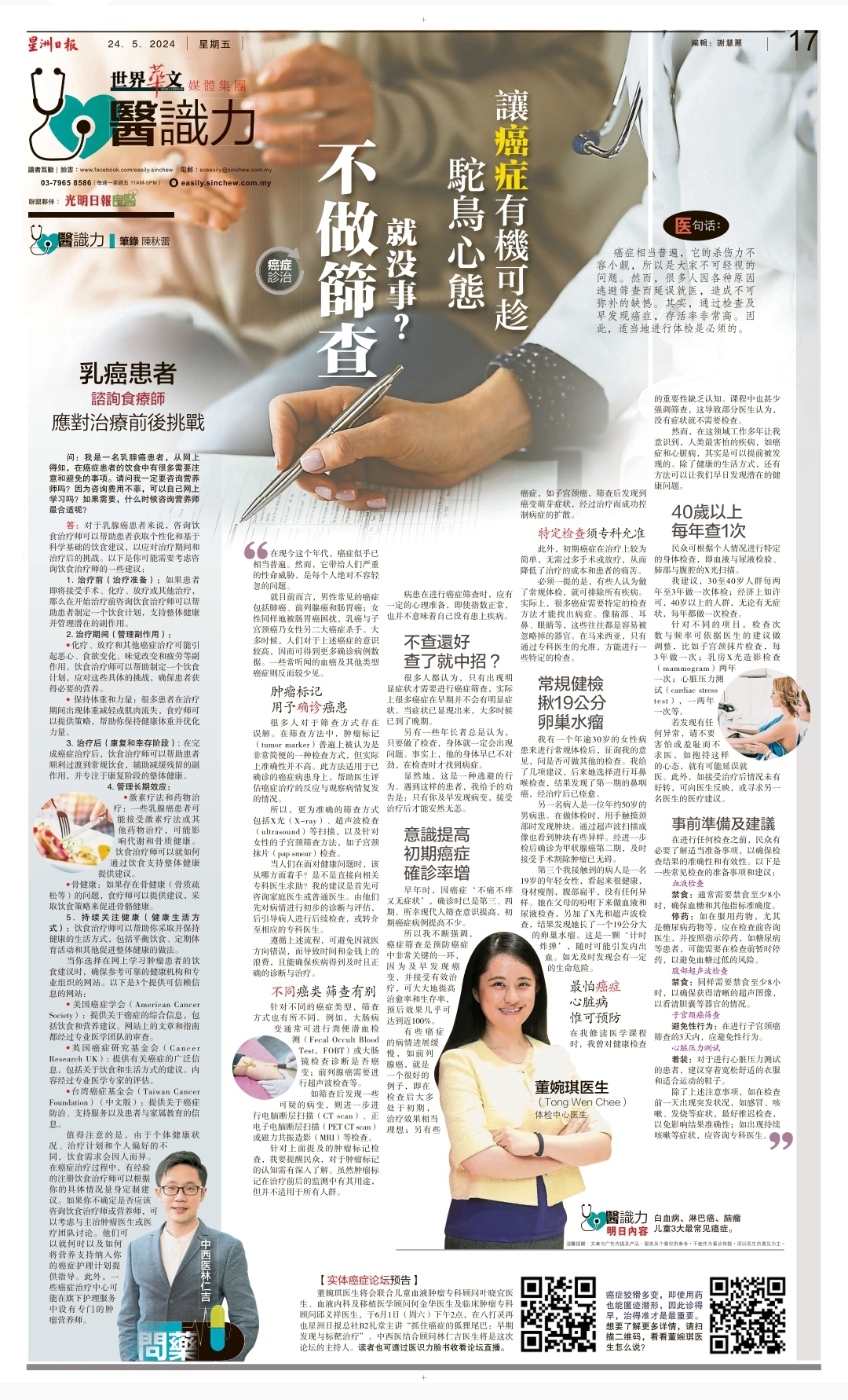Does Avoiding Screenings Mean You're Safe? Your "Ostrich" Mentality Lets Cancer Get Ahead
24 May 2024

Cancer is quite common and its lethality cannot be underestimated, so it is an issue that no one should take lightly. However, many people delay seeking medical treatment because they avoid screening for various reasons, resulting in irreparable deficiencies. In fact, early detection of cancer through screening has a very high survival rate. Therefore, proper medical check-ups are a must.
Tumour Markers for Cancer Diagnosis
Many people have misconceptions about screening methods. Among the screening methods, the tumour marker is generally regarded as a very simple test, but is actually not very accurate. It is used in patients who have been diagnosed with cancer to help doctors assess the response to cancer treatment and to monitor the recurrence of the disease.
Therefore, more accurate screening methods include scans such as x-ray and ultrasound, as well as female-specific cervical screening methods such as pap smears (pap smears).
Screening varies for different types of cancer
Screening methods vary for different types of cancer. For example, colorectal lesions are usually diagnosed with a Fecal Occult Blood Test (FOBT) or colonoscopy; prostate cancer requires an ultrasound.
If some suspicious lesions were found after screening, further tests such as computed tomography (CT scan), positronic computed tomography (PET CT scan) or magnetic resonance imaging (MRI) were performed.
 Is better don't get screened than you get it once get screened?
Is better don't get screened than you get it once get screened?
Many people believe that cancer screening is only necessary if there are obvious symptoms. In fact, many cancers do not have obvious symptoms in the early stages. In fact, many cancers do not have obvious symptoms in the early stages. When the symptoms have already appeared, most of the time it is already in the advanced stage.
Obviously, this is a kind of avoidance behaviour.
Increased awareness and diagnosis of early-stage cancer
In the early years, as cancer was 'painless and asymptomatic', it was already at stage 3 or 4 when diagnosed. Fortunately, with the increased awareness of screening among modern people, the number of early-stage cancer cases has increased significantly.
That is why I have constantly stressed that cancer screening is a very crucial part of cancer prevention because early detection of cancerous lesions and effective treatment can greatly improve the cure rate and survival rate, and the prognostic outcome can almost reach nearly 100 %.
Specialist approval for specific tests
It is important to mention that some people think that a routine medical check-up will rule out all diseases. In fact, many cancers require specific tests to identify the disease. Organs such as the brain, ears, nose and eyes are often overlooked. In Malaysia, specific tests can only be done with the permission of a specialist.
One check-up per year for people over 40 years of age
People may undergo specific body check-ups according to their personal circumstances, i.e. blood and urine tests, X-ray scanning of the lungs and abdominal cavity.
Dr Tong recommends that people aged between 30 and 40 should have a medical check-up every two to three years; and if financially feasible, people over 40 should have a check-up every year, regardless of whether they have symptoms or not.
The number and frequency of check-ups can be adjusted according to the doctor's recommendation for different items, such as pap smear once every three years, mammogram once every two years, cardiac stress test once every one or two years, and so on.
Preparation and Advice before Health Screening
Before any screening, it is necessary for the population to be aware of the proper preparation matters to ensure the accuracy and validity of the results. Below are some of the common preparations and recommendations for screening:
Blood Tests
Fasting: Fasting for at least 8 hours is usually required to ensure accuracy of blood glucose and other indicators.
Discontinuation of medication: If you are taking medication, especially diabetic medication, etc., you should consult your doctor before the test and discontinue your medication as instructed. For patients with diabetes, etc., you may need to temporarily discontinue your medication prior to the test in order to avoid the risk of your blood glucose becoming too low.
Abdominal Ultrasound
Fasting: Again, fasting for at least 8 hours is required to ensure that a clear ultrasound image is obtained to see the gallbladder and other organs.
Cervical Cancer Screening
Avoid Sexual Activity: Sexual activity should be avoided within 3 days of cervical cancer screening.
Cardiac Stress Test
Dress Code: For patients undergoing cardiac stress test, it is recommended to wear loose and comfortable clothes and shoes suitable for exercise.
In addition to the above precautions, if you have any sudden conditions such as cold, cough or fever the day before the test, it is best to postpone the test so as not to affect the accuracy of the results; if you have persistent cough or other symptoms, you should consult a specialist."
Last but not least, Dr Tong also said that her years of working in the field have made her realise that the most feared diseases, such as cancer or heart disease, can actually be detected in advance. Apart from a healthy lifestyle, there are other ways to detect potential health problems earlier.
Source: Sin Chew Daily






